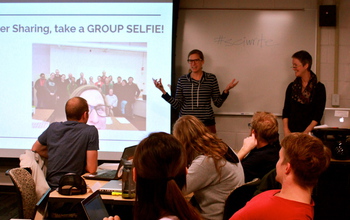News Release 17-077
NSF makes new awards for graduate education projects
Projects to test, validate potentially transformative approaches to STEM graduate education

NSF Innovations in Graduate Education program supports new ways to teach STEM.
August 10, 2017
This material is available primarily for archival purposes. Telephone numbers or other contact information may be out of date; please see current contact information at media contacts.
The National Science Foundation (NSF) has awarded $4.8 million for 10 new projects that will pilot, test and validate innovative and potentially transformative ways to teach science, technology, engineering and mathematics (STEM) in graduate education.
The awards are part of the NSF Innovations in Graduate Education (IGE) program, designed to connect students with multiple career paths, support diversity and inclusion in graduate schools, and test approaches aimed at improving communications, quantitative, teamwork and other skills critical for successful integration into the workforce.
"These IGE projects address important challenges in graduate education: diversity, career pathways and transferable skillsets," said Jim Lewis, acting assistant director for NSF's Education and Human Resources Directorate. "Learning more about what constitutes effective graduate education will enable us to prepare a STEM-capable workforce that can meet the evolving demands of a fast-paced, data-intensive, globally networked world."
While the new IGE projects are diverse, they all evaluate approaches that could be scaled for use at other institutions nationally. Researchers are currently looking at specific approaches and interventions, including career peer-mentoring, gender-based case studies, faculty and student learning communities, revamped gateway courses, community and family engagement, and digital platforms for real-time feedback.
The project titles, principal investigators and sponsor institutions for the new awards are:
- Integrating Team Science into the STEM Graduate Training Experience: Susan Cozzens, Georgia Tech Research Corporation.
- The NAVIGATE Project: A Case-Study Approach to Overcoming Barriers to Advancement for Women in STEM: Liesl Folks, SUNY at Buffalo; Coleen Carrigan, Cal Poly Foundation.
- Ph.D. Career Ladder Program: A Grassroots Approach to Career Development: Nancy Goroff, Stony Brook University, New York.
- Team Science Training for Coastal Ocean and Estuarine STEM Graduate Students: Troy Hartley, The College of William and Mary's Virginia Institute of Marine Science.
- Enhancing Learning and Retention in Graduate Physics: Andrew Heckler, Ohio State University.
- Augmenting, Piloting, and Scaling Computational Notebooks to Train New Graduate Researchers in Data-Centric Programming: James Hollan, University of California, San Diego.
- Indigenous Graduate Education in Science and Engineering -- Southwest: Allison Huff, University of Arizona.
- Reproducibility and Rigor in Quantitative Biology: A Hands-on Approach: Victoria Prince, University of Chicago.
- STEM Professional Awareness, Advancement, and Development: Cynthia Sides, University of Arkansas.
- Fostering Effective Oral Communication Skills for STEM Graduate Students: Shannon Willoughby, Montana State University.
NSF has released the next solicitation for IGE awards (NSF 17-585), and the next deadline for proposal submission is Oct. 25, 2017. More information can be found at the IGE program website.
-NSF-
Media Contacts
Bobbie Mixon, NSF, (703) 292-8485, email: bmixon@nsf.gov
Program Contacts
Laura B. Regassa, NSF, (703) 292-2343, email: lregassa@nsf.gov
The U.S. National Science Foundation propels the nation forward by advancing fundamental research in all fields of science and engineering. NSF supports research and people by providing facilities, instruments and funding to support their ingenuity and sustain the U.S. as a global leader in research and innovation. With a fiscal year 2023 budget of $9.5 billion, NSF funds reach all 50 states through grants to nearly 2,000 colleges, universities and institutions. Each year, NSF receives more than 40,000 competitive proposals and makes about 11,000 new awards. Those awards include support for cooperative research with industry, Arctic and Antarctic research and operations, and U.S. participation in international scientific efforts.
Connect with us online
NSF website: nsf.gov
NSF News: nsf.gov/news
For News Media: nsf.gov/news/newsroom
Statistics: nsf.gov/statistics/
Awards database: nsf.gov/awardsearch/
Follow us on social
Twitter: twitter.com/NSF
Facebook: facebook.com/US.NSF
Instagram: instagram.com/nsfgov
